#oresteia: agamemnon by aiskhylos
Text

Oresteia: Agamemnon by Aiskhylos, tr. by Anne Carson [ID in alt text]
173 notes
·
View notes
Text

Oresteia: Agamemnon by Aiskhylos, tr. by Anne Carson [ID in alt text]
1K notes
·
View notes
Text

Agamemnon by Aiskhylos (tr. Anne Carson)
#agamemnon#aiskhylos#anne carson#an oresteia#quote#typography#aesthetic#dark academia#dead academia#classic academia#original post#ancient greek mythology#ancient greece#dark things#classic literature
447 notes
·
View notes
Quote
Zeus put mortals on the road to wisdom
when he laid down this law:
By suffering we learn.
Aiskhylos, Agamemnon
[trans. Anne Carson]
53 notes
·
View notes
Text
CHORUS: She's keen as a hound tracking a smell.
She'll find blood, she'll tell.
Aiskhylos. "Agamemnon". An Oresteia: Agamemnon by Aiskhylos, Elektra by Sophokles, Orestes by Euripides, trans. by Anne Carson. Farrar, Straus and Giroux, 2009.
5 notes
·
View notes
Text

Aiskhylos’ Agamemnon, trans. Anne Carson
7 notes
·
View notes
Quote
I am a restrained person.
Otherwise my heart would race past my
tongue to pour out everything.
Instead I mumble,
I gnaw myself.
I lose hope.
And my mind is burning.
Anne Carson, An Oresteia: Aiskhylos, Agamemnon (2009)
1 note
·
View note
Text
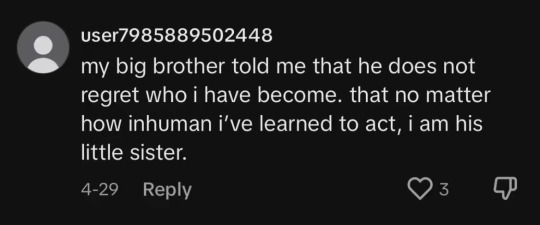






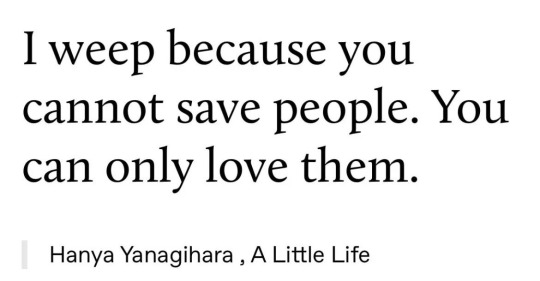

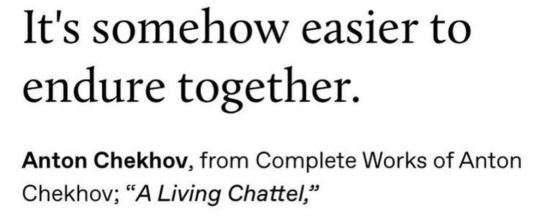
But once he is gone who will I have?
tiktok / icarly / unknown / @/mothman / An Oresteia: Agamemnon, Aiskhylos / Bumble Ardy, Maurice Sendak / icarly / A Little Life, Hanya Yaragihara / The Fall Of The House Of Usher, Steven Berkoff / A living Chattel, Anton Chekhov
#hell is a teenage girl#girlblogging#on first love#on siblings#on friendship#girly thoughts#siblinghood#older brother core#my older brother is my best friend#older brother aesthetic#web weaving#literature#youngest sister#youngest child#feminine urge#girlhood#girl blogger#girl interrupted#girl interrupted syndrome#black swan#girly things#older siblings#liexpressway#web weave#quotes
1K notes
·
View notes
Photo
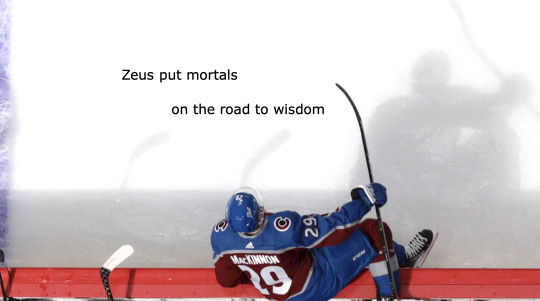





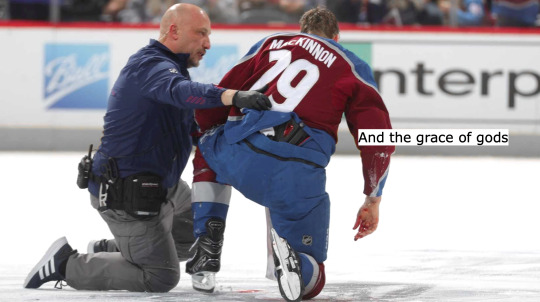


― ”Agamemnon”, Aiskhylos, trans. Anne Carson, An Oresteia.
Hockey Poetry Post 22/?
(Photo credit: Michael Martin, Matthew Stockman, Bruce Bennett, Minas Panagiotakis, link, link, link, Michael Martin, Stephen R. Sylvanie)
@national-hockey-lesbian made a Kraken post so I had to make an Avs one to balance the humors
#heard this guy on the 32 thoughts podcast describe mackinnon as a rhinoceros and ive not been able to stop thinking about that At All#anyway: a mackinnon poem as promised#hes so intense looking even when hes not covered in blood#the dramatic potential is endless#ok: tags#colorado avalanche#nathan mackinnon#hockey poetry posts#anne carson#aiskhylos#Im also going w more obscure texts now but if one more person accuses me of being a theatre kid I WILL cry
84 notes
·
View notes
Photo



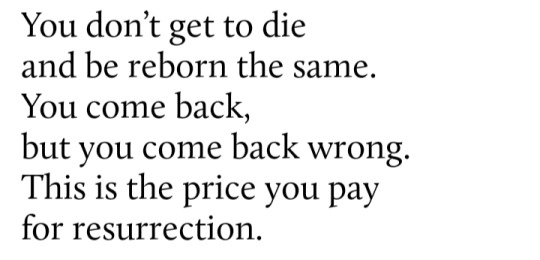
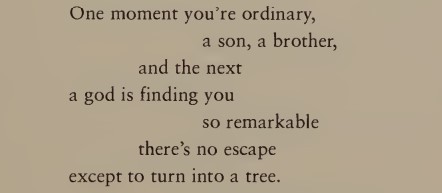



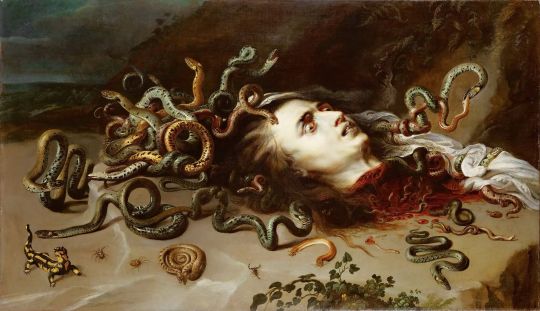

where to draw the line between the monstrous and the divine?
Code, Scherezade Siobhan | An Oresteia: Agamemnon, trans. Anne Carson, Aiskhylos | Love and Prayer, Simone Weill | Journal 1970-1986, Andrei Tarkovsky | Martyre de Saint Denis (1874-1888), detail, Léon Bonnat | The War of The Foxes, Richard Siken | Nathaniel Orion G.K. | Ovid at Fifteen, Christopher Bursk | On This Earth We’re Briefly Gorgeous, Ocean Vuong | Blue Rotunda, Louise Glück | The Waves, Virginia Woolf | Medusa (c. 1618), Peter Paul Rubens | Denouement, trans. Ellen Dori Watson, Adélia Prado
[ID: A collection of quotes and images from various sources.
1. Some people touch you and it is a form of taking. / Others touch you & it is a way of shaping.
2. And the grace of gods (I’m pretty sure) / is a grace that comes by violence.
3. Attention, taken to it’s highest degree, is the same thing as prayer. It presupposes faith and love. // Absolutely unmixed attention is prayer.
4. Why are they all trying to make me into a saint? / Oh God! Oh God! / I want to do things. Stop turning me into a saint.
5. Hera countered: You were born thirsting a mouthful of ichor from any God who would oblige. Suffering follows quench.
6. A close-up detail from The Martyrdom of St. Denis by Leon Bonnat. Saint Denis wears black robes around his waist as he kneels on the steps, reaching for his head. In the place of his head glows a light over the stump of his neck. To the left, a person can be seen recoiling in shock, as another person’s legs lie on the bloodied steps.
7. decompose eventually. We collide with place, which / is another name for God, and limp away with a / permanent injury. Ask for a blessing? You can try, / but we will not remain unscathed.
8. You don’t get to die / and be reborn the same. / You come back, but you come back wrong. / This is the price you pay / for resurrection.
9. One moment you’re ordinary / a son, a brother, / and the next / a god is finding you / so remarkable / there’s no escape / except to turn into a tree.
10. What I really wanted to say was that a monster is not such a terrible thing to be. From the Latin root monstrum, a divine messenger of catastrophe, the adapted by Old French to mean an animal of myriad origins: centaur, griffin, satyr. To be a monster is to be a hybrid signal, a lighthouse: both shelter and warning at once.
11. I am tired of having hands / she said / I want wings-- // But what will you do without your hands / to be human? // I am tired of human / she said / I want to live on the sun--
12. and I said to the star, ‘Consume me.’
13. A painting of Medusa by Peter Paul Rubens. He decapitated head lays on a rock, face frozen in shock and horror as blood pours from the wound. A variety of snakes writhe around her head amongst her hair.
14. I am beginning to despair / and can see only two choices: / either go mad or turn holy.
End ID.]
#retribution#prophethood#webweaving#ooh boy#EDIT: forgot to include the id for one of the quotes so so sorry#woe be upon ye#wubweaving
302 notes
·
View notes
Text




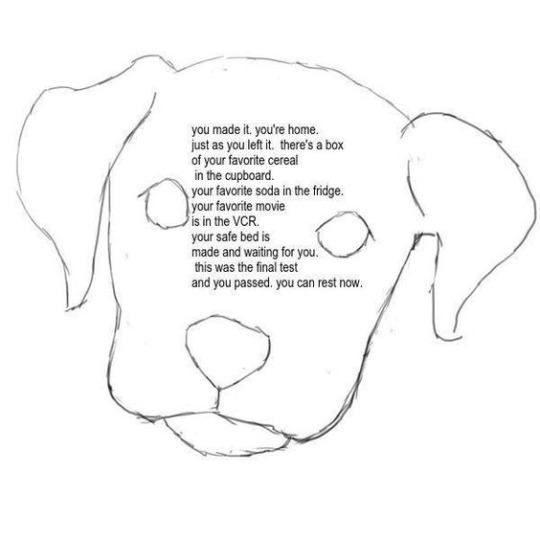
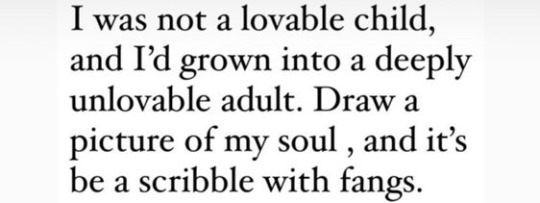


"At the end of each day, he used to ask me, 'what have you done today to deserve your eyes?'"
Clementine von Radics Mouthful of Forevers, from "That Spring Everything Grew Wild and the Rain Came Down Like Punishment" / @/haraiva (tumblr) / Mitski A Burning Hill / Sophokles Elektra, from "An Oresteia: Agamemnon by Aiskhylos; Elektra by Sophokles; Orestes by Euripides" (tr. Anne Carson) / @/jovialtorchlight (tumblr) / Gillian Flynn Dark Places / Eric LaRocca Things Have Gotten Worse Since We Last Spoke / unknown
i. Clementine von Radics Mouthful of Forevers [ "What no one ever talks about is how dangerous hope can be. Call it forgiveness with teeth." ]
ii. @/haraiva [ Three-paneled comic colored in with crayons. The first panel is the largest. It shows the perspective of the windshield of a car. The second and third panels are smaller than the first and overlap slightly. The second shows rocks by the beach. The third shows a small figure looking up at a mountain range. "I'M SORRY I LEFT SO SUDDENLY / BUT / I MADE UP MY MIND SO LONG AGO !!!" ]
iii. Mitski A Burning Hill [ "I am a forest fire / and I am the fire / and I am the forest / and I am a witness watching it" ]
iv. Sophokles Elektra [ "I am the shape you made me. / Filth teaches filth." ]
v. @/jovialtorchlight [ A pencil sketch of a dog's face. "you made it. you're home. / just as you left it. there's a box / of your favorite cereal / in the cupboard. / your favorite soda is in the fridge. / your favorite movie / is in the VCR. / your safe bed is / made and waiting for you. / this was the final test / and you passed. you can rest now." ]
vi. Gillian Flynn Dark Places [ "I was not a loveable child, and I'd grown into a deeply unloveable adult. Draw a picture of my soul, and it's be a scribble with fangs." ]
vii. Eric LaRocca Things Have Gotten Worse Since We Last Spoke [ "People like to eat other people. I spent so many years forgetting I had teeth, too." ]
ix. unknown [ Two printed images of a woman. The first shows her holding the side of her face, staring at the camera. The second is head-on and shows her looking down and clutching her head. "HAVE DRUGS STOPPED WORKING ?" ]
#clementine von radics#mouthful of forevers#mitski#a burning hill#sophokles#elektra#gillian flynn#dark places#eric larocca#things have gotten worse since we last spoke#poetry#writing#words#text#poem#spilled ink#spilled poetry#spilled thoughts#dark academia#dark academia quote#dark academia poetry#web weave#web weaving#poetry web weave#poetry ww#on self hate#on self disgust#on self destruction#spilled emotion#quote
130 notes
·
View notes
Text

Agamemnon by Aiskhylos (tr. Anne Carson)
#agamemnon#anne carson#aiskhylos#quote#an oresteia#literature#typography#aesthetic#dark academia#dead academia#classic academia#original post#theoi#ancient greece#ancient greek literature
168 notes
·
View notes
Quote
By me he fell, by me he died, I shall bury him.
Klytaimnestra in Aiskhylos’ Agamemnon
[trans. Anne Carson]
#or as i call it#a girlboss moment#klytaimnestra#clytemnestra#aischylos#aiskhylos#agamemnon#anne carson#quote#greek tragedy#the oresteia
31 notes
·
View notes
Text
KLYTAIMNESTRA: Don't squawk at me. I'm not some witless
female.
I am fearless and you know it.
Whether you praise or blame me I don't
care.
Aiskhylos. "Agamemnon". An Oresteia: Agamemnon by Aiskhylos, Elektra by Sophokles, Orestes by Euripides, trans. by Anne Carson. Farrar, Straus and Giroux, 2009.
1 note
·
View note
Text
And now the prophet forces his prophetess
down to the killing floor.
Instead of my father's altar a butcher's block
awaits me
and a hot rip of blood.
I am meat for sacrifice.
- from Agamemnon in An Oresteia: Agamemnon by Aiskhylos; Elektra by Sophokles; Orestes by Euripides, transl. Anne Carson
10 notes
·
View notes
Note
would you consider (if you havent already) making a rec list for books/authors/poets/etc? your breadth of classics knowledge and the source material you draw inspiration from always intrigues me.
I'd be happy to, but I think I might (accidentally) give the impression of being more familiar with a lot of these things than I actually am haha.
I'll focus on classics or classics-related recs, but there are some things I'll throw in here because, even though they aren't classics (or classics in the sense I think you probably mean, as in directly related to ancient Greece etc.), they've influenced what I’ve written in some way. I should also be clear, I haven’t read all of these things, sometimes only pieces, or they’re things I’ve been meaning to read and keep putting off but people might be interested in. And I’m definitely not an expert. I’m not properly educated on these topics, so I’m not sure if anything I include might be considered a bad resource by someone with a background in this field.
Also, as I was putting together this list… I was gawking at the prices of so many of these. Like 90% I grabbed at my local secondhand bookstore and I would encourage anyone interested to try to get these used (Thriftbooks is an online store to look at if you don’t have a good local store, though I’m not sure where all it ships to) or from a site like Project Gutenberg etc. Libraries are always good too, of course (some might be on Archive.org, which is a place where you can check out books online). I may be able to help you find ways to get your hands on some of these sources if you’re struggling to find it.
Fiction
Aethiopica by Heliodorus (tr. Moses Hadas) - An ancient Greek novel. “The Aethiopica tells the story of an Ethiopian princess and a Thessalian prince who undergo a series of perils (battles, voyages, piracy, abductions, robbery, and torture) before their eventual happy marriage in the heroine’s homeland.” Summary from here.
An Oresteia (tr. Anne Carson) - Carson’s translations of Aiskhylos' Agamemnon, Sophokles' Elektra, and Euripides' Orestes. Literally anything Carson touches is gold, please just read everything translated or written by her here, even if you’ve read other translations. “After the murder of her daughter Iphigeneia by her husband, Agamemnon, Klytaimestra exacts a mother's revenge, murdering Agamemnon and his mistress, Kassandra. Displeased with Klytaimestra's actions, Apollo calls on her son, Orestes, to avenge his father's death with the help of his sister Elektra. In the end, Orestes is driven mad by the Furies for his bloody betrayal of family. Condemned to death by the people of Argos, he and Elektra must justify their actions ― or flout society, justice and the gods.”
Arete: Greek Sports from Ancient Sources by Stephen G. Miller - All about the concept of arete. Exactly what it says on the tin.
The Constraints of Desire: The Anthropology of Sex and Gender in Ancient Greece by John J. Winkler - Another that’s exactly what it says on the tin. “For centuries, classical scholars have intensely debated the "position of women" in classical Athens. Did women have a vast but informal power, or were they little better than slaves? Using methods developed from feminist anthropology, Winkler steps back from this narrowly framed question and puts it in the larger context of how sex and gender in ancient Greece were culturally constructed. His innovative approach uncovers the very real possibilities for female autonomy that existed in Greek society.” (My friend has another book from this collection (?) called The New Ancient World, which I want to get if I ever actually… finish reading this one. But that one is called One Hundred Years of Sexuality, I think, and there’s another called Games of Venus, which also looks very interesting so I want to mention them.)
The Golden Ass (Metamorphoses) by Apuleius (tr. E.J. Kenney) - This is another that feels like it might go without saying, but whatever. This is where the story of Cupid & Psyche is told. If I understand correctly, this is the oldest (surviving, and possibly only?) extended account of Eros & Psyche’s myth, though art of the two appears much earlier so I assume Apuleius was drawing from older sources. “Written towards the end of the second century AD, The Golden Ass tells the story of the many adventures of a young man whose fascination with witchcraft leads him to be transformed into a donkey. The bewitched Lucius passes from owner to owner - encountering a desperate gang of robbers and being forced to perform lewd 'human' tricks on stage - until the Goddess Isis finally breaks the spell and initiates Lucius into her cult.” Actually, this is the physical copy I have and I got it just because I really wanted a physical copy, but I haven’t read it. I read a version for free online years ago when my obsession with Cupid & Psyche first took shape and I… have no clue who translated that one. But, well, here we are. You can definitely find this on Project Gutenberg, probably by a different translator, though.
Greek Fictional Letters (edited by C.D.N. Costa) - “This book explores a relatively unfamiliar and under-appreciated area of Greek literature: imaginary letters written between about 100 BC and 500 AD. Many of them are light-hearted and funny, and describe the lives of ordinary people--fisherman, farmers, courtesans. Others look at more serious and philosophical aspects of life. All the letters are translated, and the notes offer help to both expert and less informed readers.”
Grief Lessons: Four Plays by Euripides (tr. Anne Carson) - Carson’s translations of the plays Herakles, Hekabe, Hippolytos, and Alkestis. “Herakles, in which the hero swaggers home to destroy his own family; Hekabe, set after the Trojan War, in which Hektor’s widow takes vengeance on her Greek captors; Hippolytos, about love and the horror of love; and the strange tragic-comedy fable Alkestis, which tells of a husband who arranges for his wife to die in his place.”
The Iliad by Homer (tr. Robert Fagles) - Do I need to include this? I’m including this, if only to say this is the translation I have.
Medea by Euripides - This is, of course, the play depicting what happens when Jason attempts to remarry, betraying Medea. I can’t find my copy right now to specify which translation, but I didn’t particularly enjoy it anyway (the translation, not the play to be clear). Here’s a copy on Gutenberg.
The Odyssey by Homer (tr. Emily Wilson) - Again, just noting this is the translation I have more than anything.
The Voyage of Argo: The Argonautica by Apollonius of Rhodes (tr. E.V. Rieu) - Covers Jason’s quest. You can find various translations for free on Project Gutenberg.
Nonfiction
The Black Andromeda by Elizabeth McGrath - This is a paper about Princess Andromeda’s race and how it has been depicted throughout art and literature. It’s relevant to the Aethiopica and how it handles or fails to handle race.
Burial customs, the afterlife and the pollution of death in ancient Greece by Francois Pieter and Louise Cilliers - A research paper covering exactly what it says it does. I haven’t read much of this even though I really should and the parts I have read are so, so interesting.
The Encyclopedia of Ancient Greece by Carlos Gómez - General history.
Eros the Bittersweet: An Essay by Anne Carson - All about love as the ancient Greeks conceptualized it. I beg you all to read this. This is the one I’ve posted a bunch of my notes on to twitter. “A book about romantic love, Eros the Bittersweet is Anne Carson's exploration of the concept of "eros" in both classical philosophy and literature. Beginning with, "It was Sappho who first called eros 'bittersweet.' No one who has been in love disputes her," Carson examines her subject from numerous points of view, creating a lyrical meditation in the tradition of William Carlos Williams's Spring and All and William H. Gass's On Being Blue.”
The Gardens of Adonis: Spices in Greek Mythology by Marcel Detienne (tr. Janet Lloyd) - I haven’t read much of this, but I know I need to. “Rich with implications for the history of sexuality, gender issues, and patterns of Hellenic literary imagining, Marcel Detienne's landmark book recasts long-standing ideas about the fertility myth of Adonis.”
Granddaughter of the Sun: A Study of Euripides' Medea by C.A.E. Luschnig - I’ve also been posting screenshots from this as I read it because it makes me super unhinged. All about Her… “By looking at aspects of Medea that are largely overlooked in the criticism, this book aims at an open and multiple reading. It shows that stories presented in the drama of 5th century Athens are not unrelated to human beings who actually exist.”
Magika Hiera: Ancient Greek Magic and Religion - “This collection challenges the tendency among scholars of ancient Greece to see magical and religious ritual as mutually exclusive and to ignore ‘magical’ practices in Greek religion.”
Portraits of Grief: Death, Mourning and the Expression of Sorrow on White-Ground Lêkythoi by Molly Evangeline Allen - Someone’s research on funerary vases. I haven’t read much of it, but I came across it while trying to find other info and it looked interesting.
Poetry
Ovid: The Erotic Poems (tr. Peter Green) - Ovid is a Roman poet, but I think his work might be of interest. “This collection of Ovid's poems deals with the whole spectrum of sexual desire, ranging from deeply emotional declarations of eternal devotion to flippant arguments for promiscuity.”
Ovid’s Poetry of Exile (tr. David R. Slavitt) - More of Ovid’s work.
Sappho: A New Translation of the Complete Works (tr. Diane J. Rayor) - Please… Please… any translations of Sappho you can get… read them…
Miscellaneous
Desire, Discord and Death: Approaches to Near Eastern Myth by Neal H. Walls - Obviously not Greek, but I feel like anyone interested in ancient mythology about queerness, love, death, and sex would find this really interesting. “The three essays presented in this volume reveal the symbolic complexity and poetic visions of ancient Near Eastern mythology. The author explores the interrelated themes of erotic desire, divine conflict, and death's realm in selected ancient Mesopotamian and Egyptian mythological narratives using contemporary methods of literary analysis. Topics include the construction of desire in the Gilgamesh epic, a psychoanalytic approach to 'The Contendings of Horus and Seth', and gender and the exercise of power in the stormy romance of Nergal and Ereshkigal.”
Erotism: Death and Sensuality by Georges Bataille (tr. Mary Dalwood) - I haven’t read much of this and I know based on Bataille’s fiction (my man was really on some shit)… this is sure to be really unhinged. But it’s all about life, death, religion, and sex. “Bataille challenges any single discourse on the erotic. The scope of his inquiry ranges from Emily Bronte to Sade,from St. Therese to Claude Levi-Strauss and Dr. Kinsey. The subjects he covers include prostitution, mythical ecstasy, cruelty, and organized war. Investigating desire prior to and extending beyond the realm of sexuality, he argues that eroticism is ‘a psychological quest not alien to death.’” I feel like… there probably needs to be trigger warnings for this one, but who knows what lol. This is actually the main book I’ve been using to help me learn French too, which is… a choice on my part for real, but that’s getting really off topic.
23 notes
·
View notes